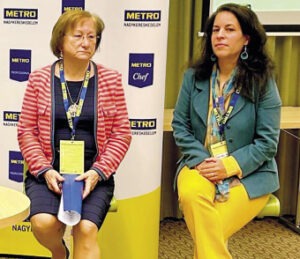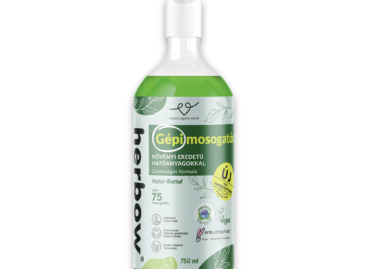Goodbye, meat!
This year the METRO Gastro Academy hosted the fourth edition of the Plant-based Conference, Hungary’s premier plant-based food event.
This article is available for reading in Trade magazin 2024/12-2025/01

Csaba Péntek
founder
Vegan Business Circle
In his welcome speech host Csaba Péntek, founder of the Vegan Business Circle stressed: this was the first time that the conference was organised without donations, solely with the help of domestic sponsors. The main motivation of the organisers is to fight against the killing of animals for food and their being kept in undignified conditions.
Patrik Galavits, journalist at Direkt36 was the moderator of the panel discussions.

Anna Zoltai and Erika Farkas
Anna Zoltai, president of National Association of Public Sector Catering Service Providers (KÖZSZÖV) and certified nutritionist Erika Farkas explained that the Hungarian child catering regulations don’t allow a vegan diet. Animal protein must be included in all main meals in nursery schools and in one main meal per day for children of other ages: this doesn’t only mean meat, but can also include dairy products and eggs.

Gergely Zsolnay
executive chef
The Planteen
How much customers are looking for plant-based dishes, how well restaurant owners can adapt to changing demand and what are the challenges concerning the presence of plant-based dishes on menus? – these were the main questions raised in a discussion with Gergely Zsolnay, chef of the restaurant The Planteen. He thinks there is no point in organising meat-free or vitamin days in the restaurant world.
Rita Szalma, commercial director of Kifli.hu, Zsuzsanna Simon, head of marketing at Avokado, Andrea Herczeg, founder of Csak a Mentes and Máté Tukacs, marketing manager of Bijó had a very interesting discussion about the place of plant-based foods in retail, focusing on the demand for plant-based foods, their popularity and their potential to enter the retail market.

Rita Szalma, Patrik Galavits, Zsuzsanna Simon, Andrea Herczeg and Máté Tukacs

Gergely Dávid Molnár
head of the mentoring programme
Szemléletváltó
Gergely Dávid Molnár, head of the mentoring programme Szemléletváltó said that a few years ago he realised: there was no company culture in Hungary where it was really good to work as an employee, so he tried to create one himself. He told that according to an APVC international survey, the global average job satisfaction of employees is 71%, but in Hungary it is 33%.
The next discussion was titled “How to grow a stable customer base?” and Federika Fait, sustainability professional and former managing director of vegan canteen and café Planteen used her own example to demonstrate the importance of regular customers in creating a stable financial situation.
Anita Szeghalmi, the owner of Vegan Kifli described her restaurant, which she opened in a residential park in Biatorbágy, as a community rather than a restaurant. György Preyer founder and manager of Vegazzi Specialty Pizzeria told that it is particularly important for a plant-based restaurant to build a workforce that wants to work there and can justify why. Before lunch the organisers provided a guided rapid networking opportunity for participants.

György Preyer, Patrik Galavits, Federika Fait and Anita Szeghalmi

Anita Batternay
managing director
PrestonSales
Anita Batternay, managing director of PrestonSales gave a presentation on how manufacturers can get their products on store shelves and how to work with international chains. It isn’t easy to take a plant-based product into restaurants. In addition to a general lack of trust, there are several quantitative and qualitative requirements to be met.

Attila Bíró, Patrik Galavits, Bernadett Zsiros and István Bruzsa
Bernadett Zsiros, the owner of Mentes Bor drew attention to the fact that vegans may be in for a big surprise in the field of wine, as usually wine isn’t only made from plant-based ingredients, since winemakers often use animal-based materials in the production process. According to István Bruzsa, sales manager of Nestlé, it is easier for a producer to enter the hospitality sector than it was 4 years ago: restaurants and hotels have realised that there is a much more sophisticated demand for meat-free food than breaded mushrooms and steamed vegetables. Attila Bíró, the owner of Sweet Gorilla Free-from Cake Workshop believes it is a problem that restaurant owners often make a judgement based on the quality of products they have ordered in the past – from non-expert manufacturers.

Raul Vida
managing director
Prove/Veganuár
Raul Vida, CEO of Prove and Veganuár has been fighting for 8 years to liberate animals and create a more empathetic world, organising programmes, campaigns, teams and collaborations. He encourages his partners to look not only for a return on their investment in working with the organisation, but also for its social impact.
In the following content creator Zsófia Rimóczi, Sláger FM’s radio presenter Gábor Garami, vegan lifestyle and nutrition consultant, founder of the Dóra Vegan Lifestyle website Dóra Pintér, and BiOrganik general manager Zsolt Szikora discussed what results can be expected from the cooperation between companies producing and selling vegan products and social media content creators.

Gábor Garami, Zsófia Rimóczi, Patrik Galavits, Dóra Pintér and Zsolt Szikora
The programme ended with participants learning about the story of Tunki Tunki – a company producing vegan dipping sauces and sandwich creams – from owners Melinda Fehér and Róbert Kulcsár. Barna Nagy, head of the communication agency Kreatív Linien that is renewing the brand also took part in the conversation. //.

Barna Nagy, Patrik Galavits, Róbert Kulcsár and Melinda Fehér
//
Related news
Herbow Dishwasher Detergent
🎧 Hallgasd a cikket: Lejátszás Szünet Folytatás Leállítás Nyelv: Auto…
Read more >Related news
How Coca-Cola plans to build more billion-dollar brands
🎧 Hallgasd a cikket: Lejátszás Szünet Folytatás Leállítás Nyelv: Auto…
Read more >Tesco sets out store expansion plans in 2026 including five former Amazon Fresh sites
🎧 Hallgasd a cikket: Lejátszás Szünet Folytatás Leállítás Nyelv: Auto…
Read more >Brits Embrace At‑Home Celebrations While Germans Cut Back on Valentine’s Day Spending
🎧 Hallgasd a cikket: Lejátszás Szünet Folytatás Leállítás Nyelv: Auto…
Read more >








